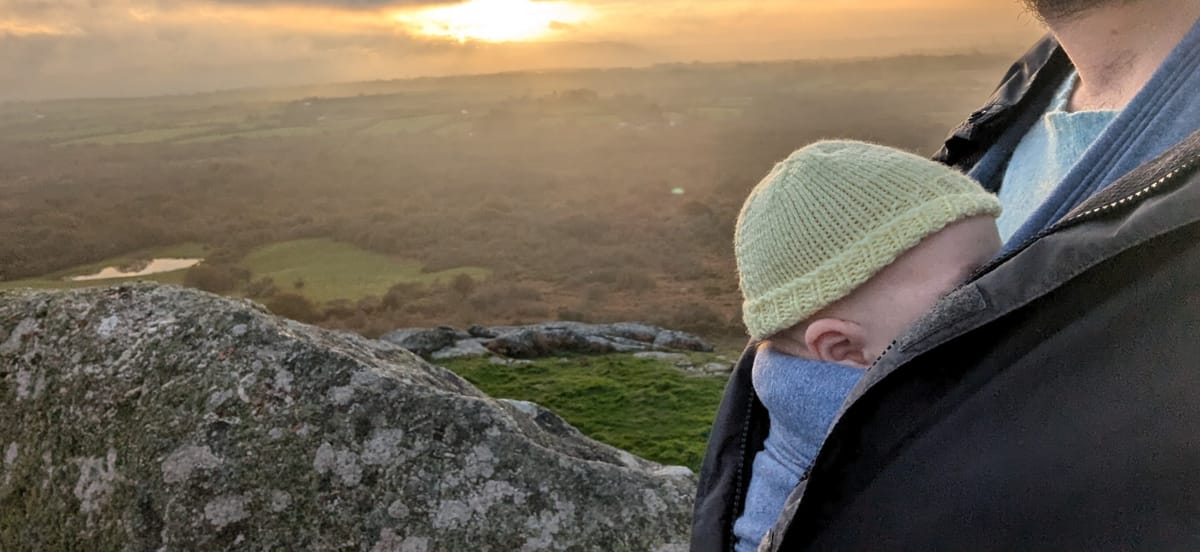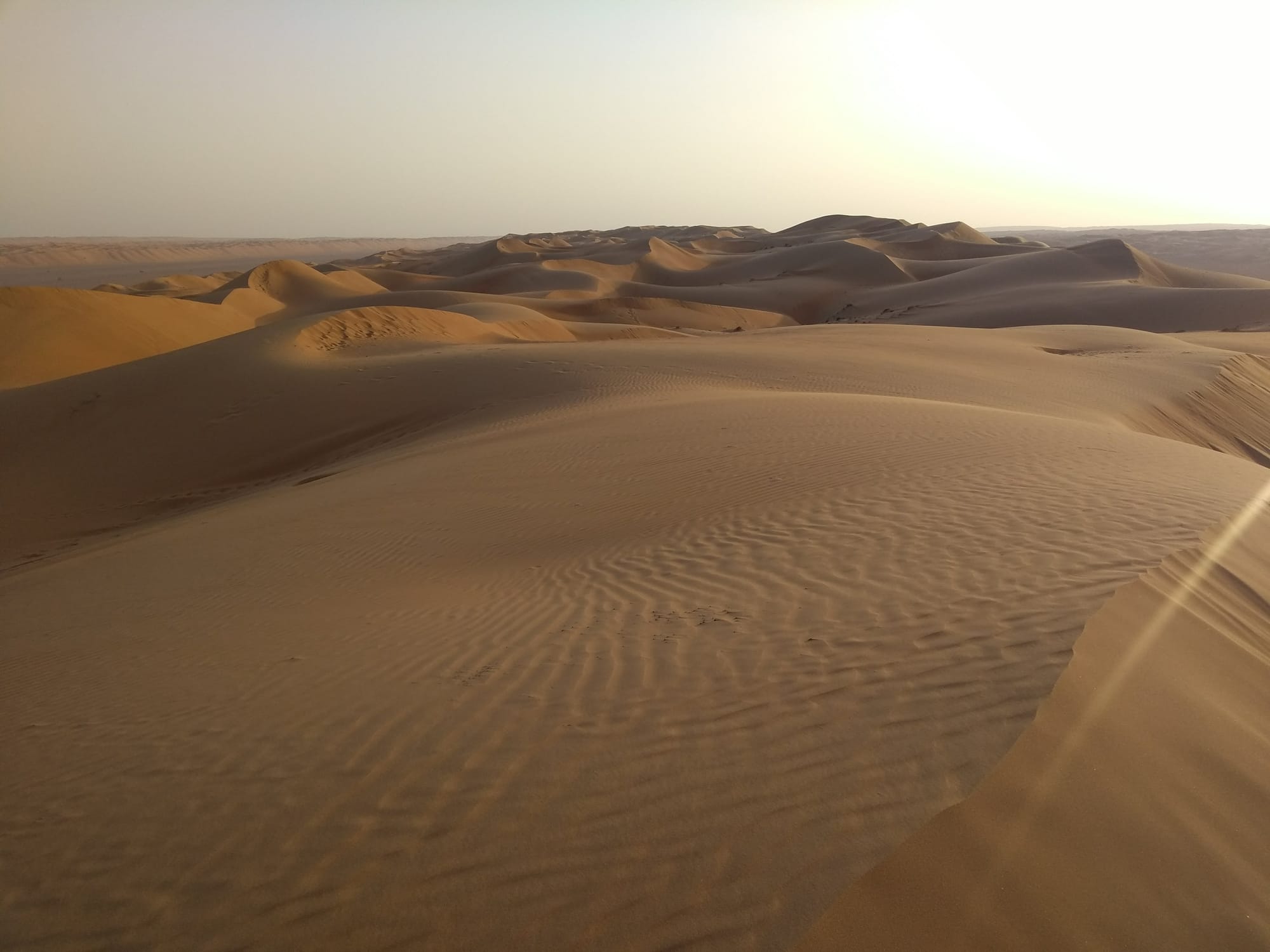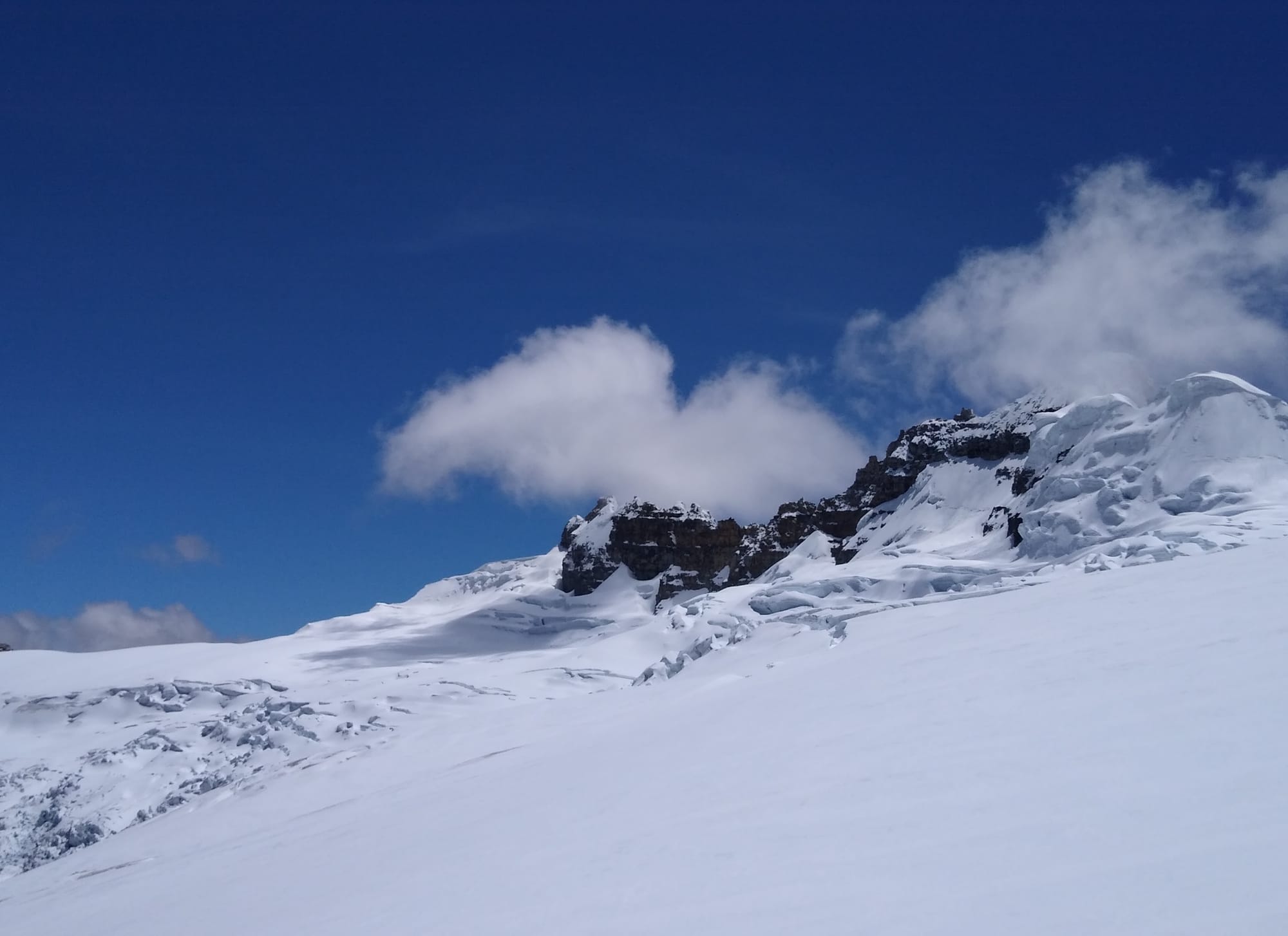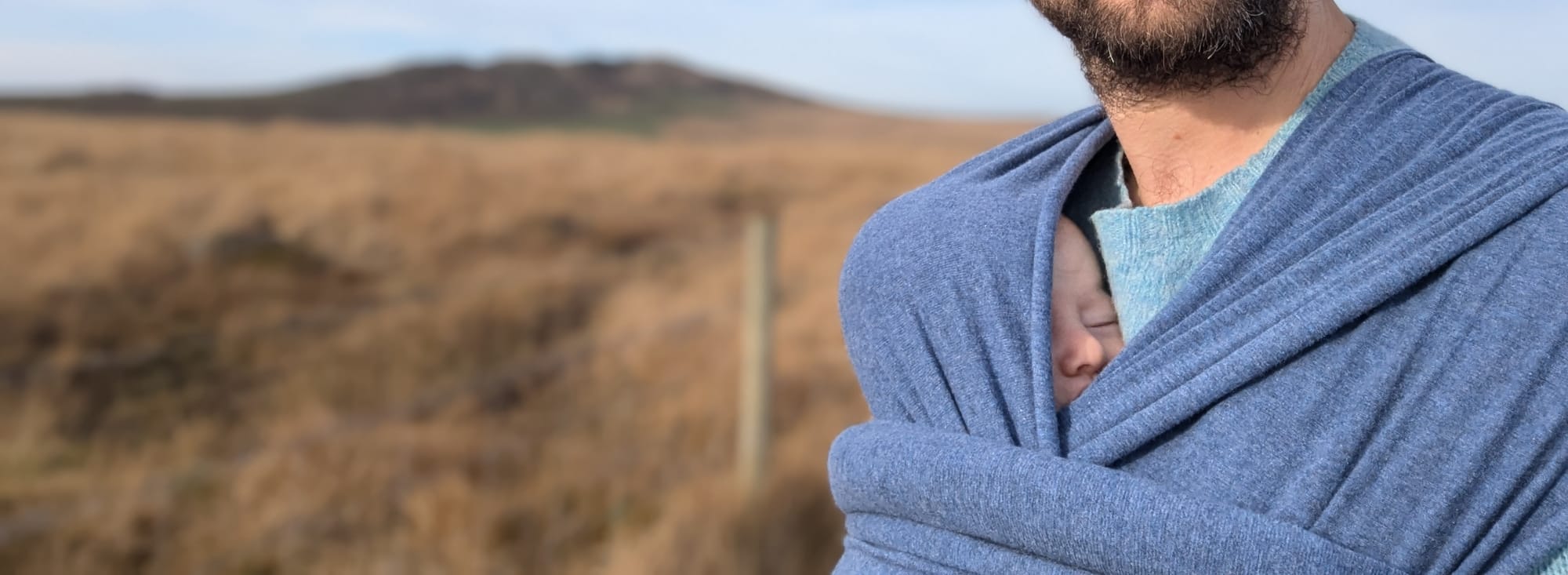Out of utopia: walking with Ursula Le Guin's Finders
Le Guin's 'Initiation Song from the Finders' Lodge' offers some few clues to a wiser, gentler conception of where the value really lies in travel and exploration.

When our son was just a few months old, he would nap during the day only when carried in a sling on the front of one of his parents. Like lots of babies, he depended on the warmth and closeness of our bodies, and on the comforting cadence of our footsteps. We couldn’t put him down, and he would remain sleeping only if we continued to move. His mother could sometimes keep him asleep while staying in the house, moving rhythmically as she went about other tasks, and bouncing him if he began to stir. But it never worked for me: only the steady beat of walking would do. Sometimes I would try to walk on the spot with him, but he had a keen instinct for deception, and would wake up and howl. I did a lot of walking in those days.
I got into the habit of singing to him as we went, or talking to him, or reciting one of the small number of poems I know by heart. The thing I recited most often was ‘The Initiation Song from the Finders’ Lodge’, by Ursula K Le Guin:
Please bring strange things.
Please come bringing new things.
Let very old things come into your hands.
Let what you do not know come into your eyes.
Let desert sand harden your feet.
Let the arch of your feet be the mountains.
Let the paths of your fingertips be your maps
and the ways you go be the lines on your palms.
Let there be deep snow in your inbreathing
and your outbreath be the shining of ice.
May your mouth contain the shapes of strange words.
May you smell food cooking you have not eaten.
May the spring of a foreign river be your navel.
May your soul be at home where there are no houses.
Walk carefully, well loved one,
walk mindfully, well loved one,
walk fearlessly, well loved one.
Return with us, return to us,
be always coming home.
Le Guin calls it a song rather than a poem, and although I haven’t ever tried to sing it, I did tread it out with the metre of my steps, as a kind of chant, more like a psalm or a blessing from a religious ceremony than anything else, which of course is just how it is intended.
The ‘Initiation Song’ comes from Le Guin’s 1985 novel Always Coming Home, and it belongs to the Kesh, an imaginary people whose culture is the subject of the book. Within their society, the ‘Finders’ Lodge’ is a kind of guild or common interest group devoted to what we might call exploration, although the status of that activity among the Kesh is rather different from the one it holds in our own society. A little like Tolkien’s hobbits, the Kesh are rather sceptical of adventures; they are marvellously intimate with their own homeland, living in a profoundly sacral relationship with the landscape and its non-human inhabitants, and although they are not immune from youthful wanderlust they are wary of the dislocation that can result from venturing too far from the world in which each person’s psyche is safely anchored.
As well as being deeply rooted in their homeland, the Kesh are loosely matriarchal, have no formal government or coercive authority, and have a nuanced approach to wealth and possessions, being suspicious of acquisitive behaviour and valuing generosity over accumulation. In this social context, the Finders are rather ambiguous figures: they perform some useful services, and they provide a means for the restless members of society to scratch their itchy feet, but on the whole they are more likely to be pitied for their inability to sit still than to be praised for their courageous exploits.
They could not be further from the Victorian archetype of the bold, heroic explorer, lionised for extending the reach of civilisation into parts unknown (or at least, unknown to members of a specific white male elite). Nor do the Kesh have any interest in platitudes about travel broadening the mind: that’s not necessary for a people who haven’t narrowed their minds in the first place. But in Le Guin’s utopia, stripped of the veneer of glamour that surrounds exploration in cultures that are geared towards expanding, acquiring, dominating and exploiting, the Finders provide an opening for a wiser, gentler conception of where the value really does lie in travel and exploration.

The choice of language in the ‘Initiation Song’ tells its own story. It is unfailingly tactile and concrete: there’s nothing remotely abstract or intellectual or conceptual in the idea of travel that comes across here. Let very old things come into your hands—may you smell food cooking you have not eaten—and best of all, may your mouth contain the shapes of strange words. Even the cognitive process of learning a new language becomes first and foremost a bodily experience.
Where there are metaphors—let the arch of your feet be the mountains—they are still entirely concrete, one physical thing identified with another, in a way that mirrors the Kesh understanding of the unity of people and their environment. It’s a manifesto for travel as an embodied, sensory experience, free from the necessity to judge or categorise. Among the Finders, exploration is not something you do with your brain, with your analytical faculties. It’s not even something you do with your eyes. It’s something you do with your hands, your feet, your mouth, your skin.
And then there’s the purpose of travel—not, of course, unpacked in detail or subjected to theoretical examination, but gently implied. It allows for the natural attraction of new things, strange things, for a sense of wonder, and even for a wish to acquire things and bring them back. But there’s no sense of greed: strange and new things will not be accumulated as a form of wealth, but only as a source of interest, a way of transmitting knowledge to others back home. And again, it must be embodied: there is no request to tell endless stories, to make sketches, to write voluminous accounts in the journals of the Royal Geographical Society. Better to bring a single ornament, an unusual rock, a piece of fabric, and let it be passed from hand to hand, and then perhaps set aside for somebody else to discover.
The triad near the end of the song reaches a surprising conclusion. Walk carefully, walk mindfully: so far, so characteristically Kesh. And then: walk fearlessly. Is that a departure from the modest, sensible, measured approach we have come to expect of these people? Is it embracing the kind of risk-taking that left Scott and his companions frozen to death on their way back from the South Pole, or the bodies of Mallory and Irvine lost somewhere in crevasses on the slopes of Everest, never to be recovered?
I think not. Fearlessness is neither recklessness nor bravery. Recklessness ignores risk and forges on regardless, at least until the miscalculation becomes clear. Bravery confronts risk, feels fear, and decides to overcome it. Fearlessness is neither of these. To be truly fearless is to have nothing to fear: in part because the risks are not excessive in the first place, but also because the possibility of something going wrong is fully understood and accepted; because pain and even death can be faced if necessary with equanimity; because there is no sense of guilt at having gambled with the welfare of others, and disaster need not be an object of fear. Many brave people attempt to climb K2, and some reckless people too. I wonder how many climbers on that mountain are fearless.

This brings us to the final message of the song, and the one that brings tears to my eyes when I say it to my son. Return with us. Return to us. Be always coming home.
On one level, it might be a platitude: ‘safe travels’, as we say whenever someone gets into a car or sets off to catch a flight. But of course it runs deeper, and again it’s at odds with the place that travel and exploration occupy in our culture.
Quests are everywhere in our literature; the difficult journey with an important goal is a basic archetype of storytelling all around the world. And the return home is part of that blueprint: but generally speaking, throughout the course of the quest, narrators, readers and listeners all buy into the assumption that the ostensible purpose of the journey is actually the most important thing in the story. It is only at the end that we receive, as if we’ve never heard it before, the revelation that the homecoming is really what matters. We are all complicit throughout the journey in this ironic focus on the goal of the quest, and pretend to be surprised when the moral turns up: either that it was the journey that mattered, not the destination; or that the very thing the hero was looking for was right there at home all along.
The Kesh do not buy into any of this nonsense. It’s self-evident to them that the essence of a journey is in the experience of the traveller, not in the achievement of some arbitrary goal or the acquisition of honour and treasure, and that there is not much point in going on adventures if you don’t make it back safe and sound at the end. Getting home in one piece is an obligation that a functional, caring society places very explicitly on the traveller, and an obligation that courageous explorers in the mould of the Victorian heroes may have held too cheaply. Not only that, but that the homecoming is not an afterthought: it begins with the first step on the outward leg. It’s the place to which the whole arc of the journey must bend. Do not set out in a straight line, set out in a circle.

I do not know if my son will be a traveller, or what kind of traveller he will be. His early insistence on the rhythm of our footsteps might be a clue: he won’t put up with a facsimile of walking, he wants the real thing. Then again, it might not be any clue at all. He will choose his own path. But if he is to be an explorer of sorts, I hope for his sake and for my own that he might take the ‘Initiation Song’ as his guide.
In the meantime I try to take it as my own guide: to walk carefully, walk mindfully, to let my body wander rather than my thoughts, to let these daily excursions remain an embodied experience. I walk with my son wrapped up on my front, feel how each heel strike reverberates through my own bones, and how each stride makes his little head rock gently against my chest. At some point he will wake, and cry, and I will not fear it. The journey serves its own purpose, and when he has finished sleeping, we will go back into the warmth of the house, back to his mother. Return with us, I whisper to him. Return to us. Be always, always, always coming home.
The 'Initiation Song from the Finder's Lodge' is from Always Coming Home by Ursula K Le Guin (Harper and Row 1985). The link is to Bookshop.org: I receive a 10% commission on any sales via the link, with a matching 10% going to support independent bookshops.
Images:
1. Helman Tor, Cornwall. Photograph by John Frew.
2. Wahiba Sands, Oman. Photograph by John Frew.
3. Ritak'uwa (Ritacuba Negro), El Cocuy, Colombia. Photograph by John Frew.
4. Bodmin Moor, Cornwall. Photograph by Anna Testar.